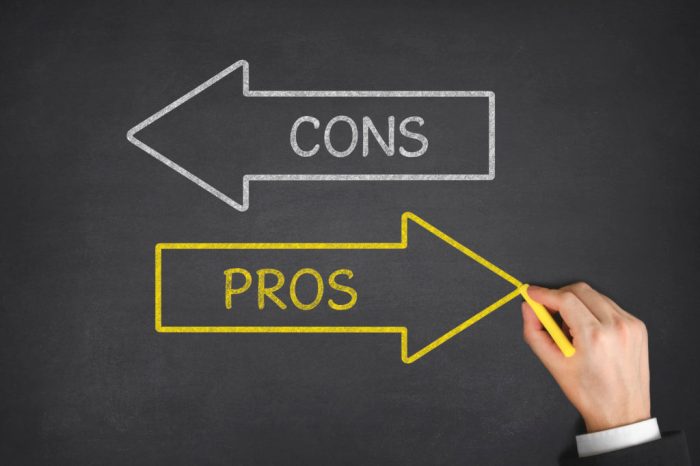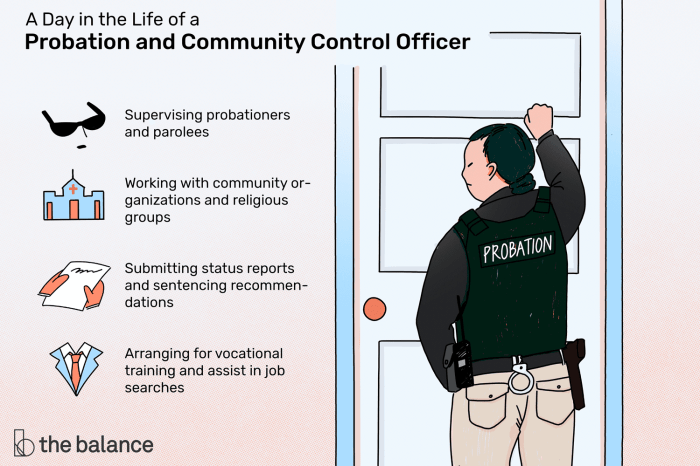Pros and cons of probation – Embarking on a journey into the realm of probation, we will delve into its multifaceted nature, exploring both its advantages and potential drawbacks. Probation, a legal alternative to incarceration, offers a unique opportunity for individuals to avoid the negative consequences of criminal behavior while striving for rehabilitation and reintegration into society.
As we navigate the pros and cons of probation, we will uncover its role in reducing recidivism, its impact on individuals, and the alternatives that exist within the criminal justice system.
Advantages of Probation

Probation provides numerous benefits compared to incarceration. It allows individuals to remain in their communities while serving their sentences, maintaining employment, family ties, and access to support services. By avoiding the negative consequences of incarceration, probationers can better address the underlying factors that contributed to their offenses and work towards rehabilitation.
Reducing Recidivism
Probation has been shown to reduce recidivism rates by providing supervision, support, and opportunities for rehabilitation. Probation officers monitor probationers’ progress, provide guidance, and connect them with resources to address their needs. This support can help probationers make positive changes in their lives, reducing the likelihood of future criminal behavior.
Disadvantages of Probation

Probation can be a valuable tool for rehabilitation, but it also has its drawbacks. One potential disadvantage is the limitations it places on an individual’s freedom and privacy.
Supervision and Reporting Requirements
Individuals on probation are typically subject to regular supervision by a probation officer. This may involve frequent check-ins, home visits, and drug or alcohol testing. These requirements can be time-consuming and intrusive, making it difficult for individuals to maintain a normal life.
Consequences of Violating Probation Terms
Another disadvantage of probation is the potential consequences of violating its terms. If an individual violates the conditions of their probation, such as failing to report to their probation officer or committing a new crime, they may be subject to a range of penalties, including imprisonment.
Types of Probation

Probation is a sentence that allows a person convicted of a crime to serve their sentence in the community under the supervision of a probation officer. There are several different types of probation, each with its own purpose and conditions.
Supervised Probation, Pros and cons of probation
Supervised probation is the most common type of probation. A person on supervised probation will be required to meet with a probation officer on a regular basis, usually once a month. The probation officer will monitor the person’s progress, make sure they are complying with the conditions of their probation, and provide support and guidance.
Unsupervised Probation
Unsupervised probation is a less common type of probation. A person on unsupervised probation will not be required to meet with a probation officer on a regular basis. However, they will still be required to comply with the conditions of their probation, such as not committing any new crimes, paying fines and restitution, and completing community service.
Electronic Monitoring
Electronic monitoring is a type of probation that uses electronic devices to track a person’s movements. A person on electronic monitoring will be required to wear a GPS ankle bracelet or other tracking device. The device will track the person’s location and report it to the probation officer.
Examples of How Different Types of Probation Are Used in Practice
Supervised probation is often used for people who have been convicted of nonviolent crimes, such as theft or drug possession. Unsupervised probation is often used for people who have been convicted of less serious crimes, such as traffic violations. Electronic monitoring is often used for people who have been convicted of violent crimes or who have a history of absconding from probation.
Impact of Probation on Individuals
Probation exerts a profound influence on individuals, shaping their psychological and social well-being. Probationers grapple with a myriad of challenges and opportunities that can significantly impact their employment prospects, relationships, and overall sense of well-being.
Psychological Effects
Probation can trigger a range of psychological distress, including anxiety, depression, and feelings of shame and guilt. The constant threat of supervision and potential incarceration can create a pervasive sense of uncertainty and fear. Moreover, probationers may struggle with low self-esteem and a diminished sense of personal agency.
Social Effects
Probation also has significant social implications. Probationers may face stigma and discrimination from their communities, making it difficult to secure employment, housing, and maintain relationships. They may also experience social isolation as friends and family distance themselves due to their criminal record.
Challenges and Opportunities
Probation presents both challenges and opportunities for individuals. While it can be a punitive measure, it can also serve as a catalyst for positive change. Probationers have the chance to address the underlying causes of their offending behavior through therapy, counseling, and educational programs.
Successful completion of probation can restore their rights and provide a pathway to reintegration into society.
Employment
Probation can hinder employment prospects, as many employers are reluctant to hire individuals with criminal records. Probationers may also face challenges obtaining professional licenses or certifications required for certain occupations. However, some employers recognize the potential for rehabilitation and may be willing to give probationers a chance.
When considering the pros and cons of probation, it’s crucial to remember the significance of understanding the nuances of the law. For instance, the unit 3 exam Joshua’s law highlights the importance of comprehending the legal framework surrounding probation and its implications.
By examining the complexities of the law, we can make informed decisions regarding the advantages and disadvantages of probation, ensuring its appropriate and effective implementation.
Relationships
Probation can strain relationships with family and friends. The stigma associated with probation can lead to rejection and withdrawal. However, supportive relationships can play a crucial role in helping probationers succeed. Family and friends can provide emotional encouragement, practical assistance, and a sense of belonging.
Overall Well-being
The cumulative effects of probation on individuals can significantly impact their overall well-being. Probationers may experience physical health problems due to stress, lack of access to healthcare, or substance abuse. They may also struggle with mental health issues, such as depression and anxiety.
Addressing these challenges is essential for probationers to achieve long-term success and reintegration into society.
Probation and Rehabilitation

Probation plays a crucial role in facilitating the rehabilitation and reintegration of individuals into society after committing offenses. It provides a structured environment that allows offenders to address the underlying causes of their behavior and develop positive coping mechanisms.
Probation offers a range of programs and services designed to support rehabilitation efforts. These include:
Cognitive Behavioral Therapy
- CBT helps offenders identify and change negative thought patterns and behaviors that contribute to criminal activity.
- Through CBT, individuals learn to develop problem-solving skills, emotional regulation techniques, and strategies for managing triggers.
Substance Abuse Treatment
- For offenders with substance abuse issues, probation provides access to evidence-based treatment programs.
- These programs address the underlying causes of addiction and help individuals develop strategies for staying sober.
Education and Vocational Training
- Probation recognizes the importance of education and employment in reducing recidivism.
- It offers programs that help offenders obtain GEDs, vocational training, and job placement assistance.
Community Service
- Community service allows offenders to make amends for their actions while giving back to society.
- It provides opportunities for offenders to develop empathy and a sense of purpose.
Research has shown that probation is an effective tool in reducing recidivism and promoting positive outcomes for offenders. A meta-analysis of 114 studies found that probation reduced recidivism by 10% compared to incarceration.
Probation provides a cost-effective alternative to incarceration while allowing offenders to remain in their communities and maintain family and employment ties. It offers a structured and supportive environment that can help individuals break the cycle of crime and lead productive lives.
Alternatives to Probation: Pros And Cons Of Probation

Probation is not always the most suitable sentencing option, especially for first-time offenders or those with minor offenses. Several alternative sentencing programs offer more flexible and rehabilitative approaches.
The eligibility for alternative sentencing programs varies depending on the jurisdiction and the specific program. Generally, they are designed for non-violent offenders with no prior criminal history or those who pose a low risk of reoffending.
Community Service
Community service involves performing unpaid work for a non-profit organization or government agency. It allows offenders to give back to the community while developing new skills and a sense of responsibility.
Electronic Monitoring
Electronic monitoring uses GPS or radio frequency technology to track an offender’s location. It restricts their movement to specific areas or times, providing an alternative to incarceration while maintaining accountability.
House Arrest
House arrest confines an offender to their residence, with limited exceptions for work, medical appointments, or other approved activities. It provides a structured environment while allowing the offender to maintain family and community ties.
Intensive Supervision Probation
Intensive supervision probation involves frequent contact with a probation officer, regular drug testing, and other strict monitoring measures. It provides a higher level of supervision than traditional probation, but it can also offer more support and resources to help the offender succeed.
Restorative Justice Programs
Restorative justice programs focus on repairing the harm caused by the offense. They bring together the offender, the victim, and the community to facilitate dialogue, accountability, and healing.
FAQ Resource
What are the main advantages of probation?
Probation offers several advantages compared to incarceration, including reduced costs, increased opportunities for rehabilitation, and the preservation of family and community ties.
What are the potential drawbacks of probation?
Probation can come with limitations on freedom and privacy, supervision and reporting requirements, and the potential for revocation if the terms are violated.
How does probation impact individuals?
Probation can have significant psychological and social effects on individuals, affecting their employment, relationships, and overall well-being.
What role does probation play in rehabilitation?
Probation provides a framework for rehabilitation by offering access to programs and services that address the underlying causes of criminal behavior, such as substance abuse, mental health issues, and lack of education or employment.
What are some alternatives to probation?
Alternatives to probation include fines, community service, suspended sentences, and drug courts, each with its own criteria and eligibility requirements.
